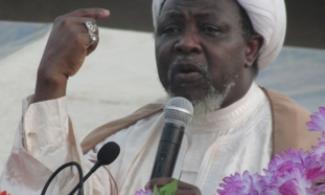
The 13-member Judicial Commission, which was presided over by Justice Mohammed Garba, found that the Nigerian army was responsible for the killing of 347 Shia Muslims and dumping them in a mass grave in the northern city of Kaduna in December 2015.
Members of the Islamic Movement in Nigeria (IMN) in Kaduna State protested the continued detention of their leader Sheikh Ibrahi El-Zakzaky and other members of the sect on Wednesday.
The protesters included children between the ages of 10 and above and some adults, who marched through Muhammadu Buhari Way in the Kaduna metropolis.
According to the Kaduna State Police Public Relations Officer, ASP, Aliyu Usman, the Shiites were not issued a permit order for the protest.
“They did not take permission from us," he said.
The demonstrators bore placards displaying pictures of their leader El-Zakzaky and chanted, demanding for the release of their leader.
“He needs to go for medical treatment,” they said.
It is general knowledge that during the clash between the Nigerian military and Shiite Muslims in Zaria, in mid-December 2015, ended with the massacre of over 300 Shiites and the detention of El-Zakzaky, who lost his left and eye and was partially paralyzed, and his wife Zeenat.
The Zaria massacre, as it was called, led to the formation of a Commission for Judicial Inquiry which looked into the event.
The 13-member Judicial Commission, which was presided over by Justice Mohammed Garba, found that the Nigerian army was responsible for the killing of 347 Shia Muslims and dumping them in a mass grave in the northern city of Kaduna in December 2015.
“The Nigerian Army used excessive force,” the report said.
The cleric, El-Zakzaky has been held in detention since December.
His call for an Iranian-style revolution to create an Islamic state in the country’s north sparked controversy with Nigeria’s secular authorities.
According to Mausi Segun, Nigeria researcher at Human Rights Watch, “Political and military authorities in Nigeria should heed the Commission's recommendations and take immediate steps to hold those responsible for the illegal use of lethal force to account and to pay compensation to the victims.”
However, the report said members of the sect, which has been known for “the practice of radicalizing its members” and engaging in “habitual acts of lawlessness,” should be held responsible. It called for the sect’s leader, Sheikh Ibrahim Zakzaky, who was arrested during the clashes, to be held personally responsible “for refusing to call his members to order when required to do so.”
The report also read, “The Commission also made some general recommendations that affect both Federal and State Governments relating to employment, responsibility of parents to their children, enhancing citizenship, the role of traditional institutions and proliferation of small arms and light weapons in the country.”
